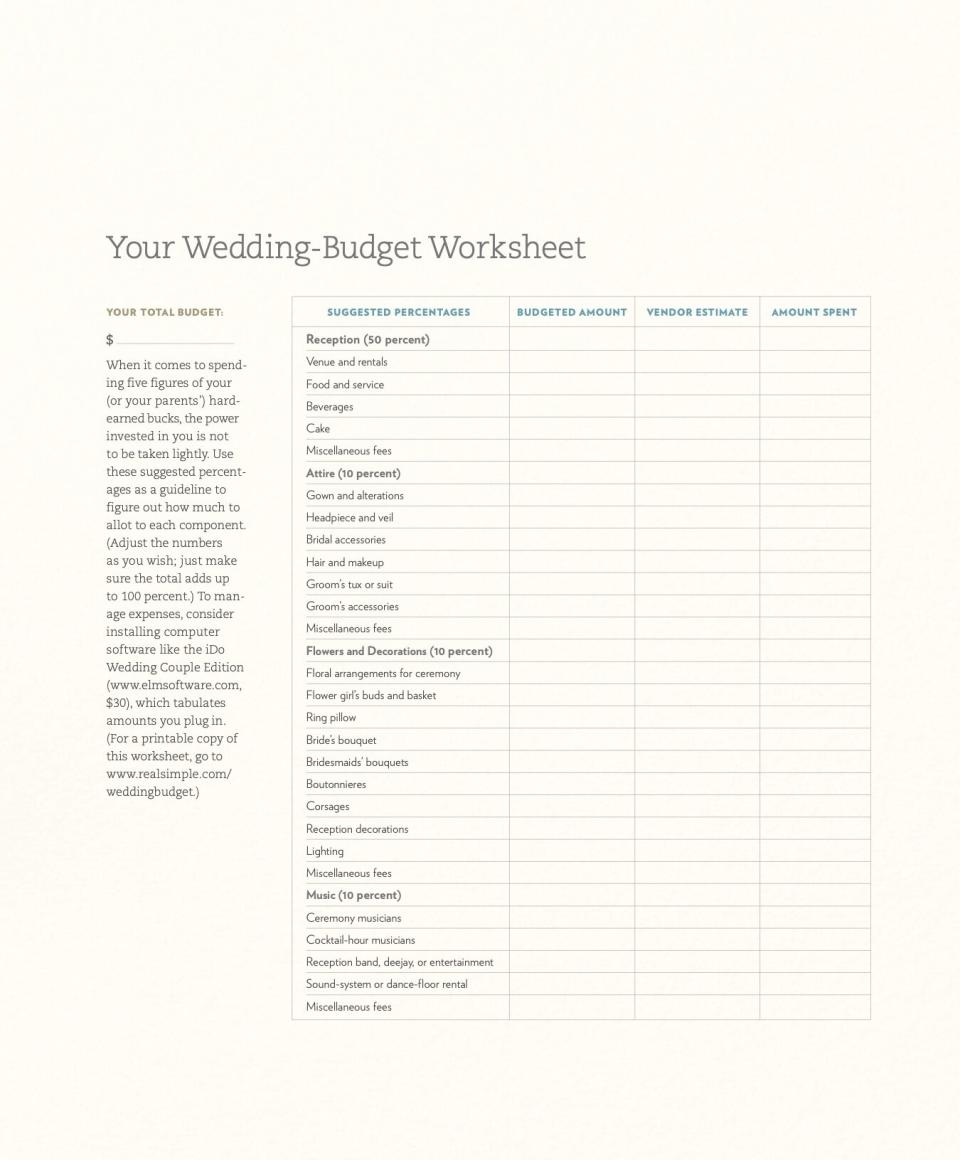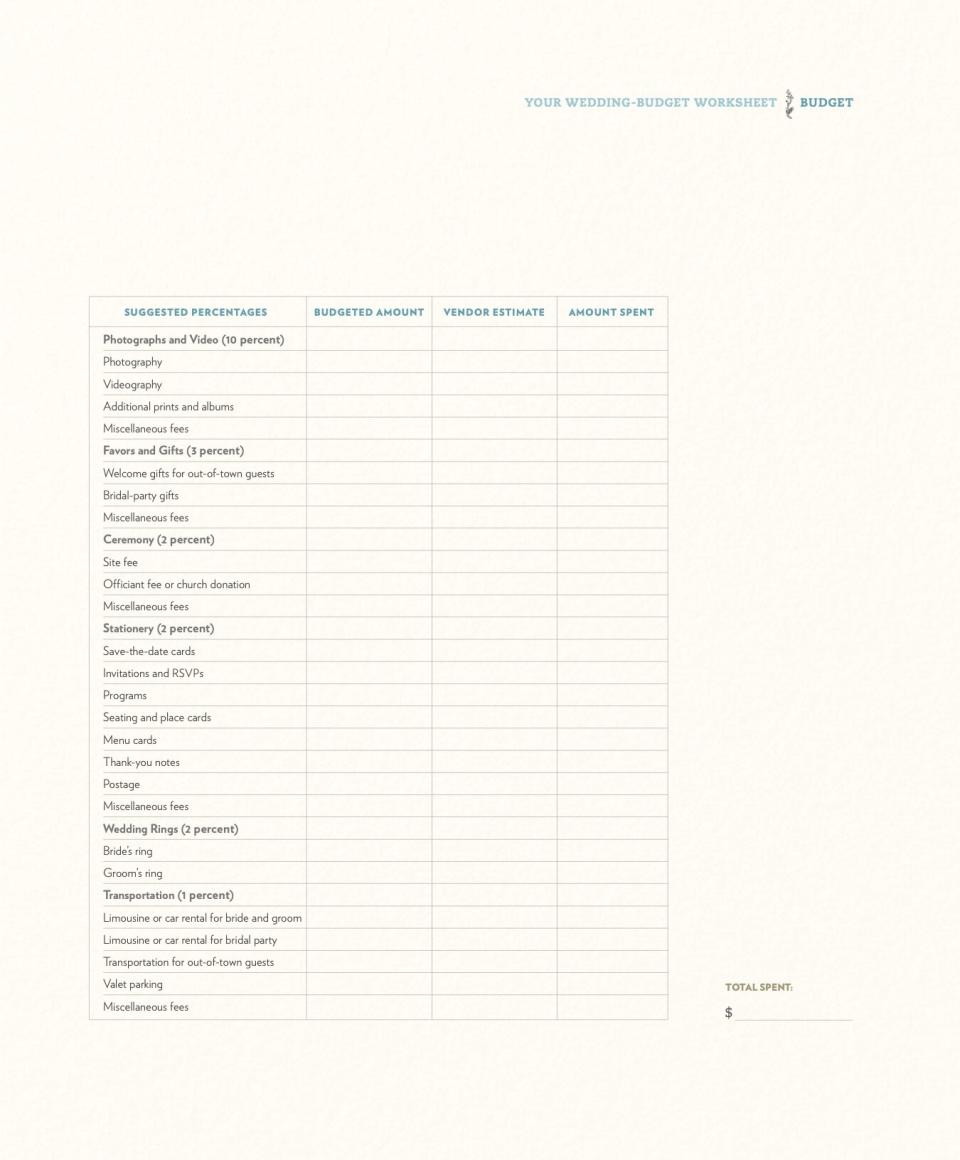How to Make a Wedding Budget—and Keep Your Spending in Check
If your Instagram feed is anything like mine, it's probably filled with pictures and videos of people getting married—after all, we are in the middle of wedding season. What many of us probably don't see on our social platforms are the expenses and budgeting part of planning a wedding, which you will have to face no matter how small or simple you want your day to be. The average cost of a wedding in 2020 was $19,000, according to a survey by The Knot. The number was down from 2019's average of $28,000 because of the impact COVID had on weddings.
While data is still unavailable for 2021, The Knot estimates the average wedding reception cost $22,500 in 2021. The number is expected to rise again in 2022 with more weddings taking place, but with the pandemic still affecting gatherings, people may choose to stick to smaller ceremonies.
If you have considered eloping more than once just by looking at some of the costs (I know I have), then don't worry, there are ways to have a beautiful, memorable celebration of your love without breaking the bank. Here are ideas to help you plan the wedding you have always dreamed of—on a budget.
Come up with a detailed budget—and stick to it.
First things first—build your wedding budget. It's important to have a budget that is detailed and accounts for everything, big and small, so there aren't any unexpected expenses that come up. Plus, it could serve as a to-do list of what to buy or arrange for.
"Seventy-five percent of your budget will likely be comprised of the venue, food, and beverage," says certified financial planner Claire Beams. A bride-to be herself, Beams suggests figuring out those big expenses first so you know how much you have to spend on everything else. She says to allocate $500 to $1,000 for unexpected expenses.
Having a discussion with your partner about your expectations and how much you want to spend on things will help you come with an accurate budget and stick to it. Once you have the numbers figured out, it's easier to seek out vendors because you can choose based on who can work with your budget.
Consider limiting the guest list to family and close friends.
If you want to have a budget-friendly wedding, take a good look at your guest list. "Your guest list is the No. 1 factor in determining your budget," says wedding planner Cheryl Sullivan. Sullivan says the easiest way to reduce wedding costs or stay within budget is to limit your guest list.
Coming up with your guest list and total head count should be one of the first things you do, along with your budget, because this determines your bottom line for the venue, food, and other vendors. Ashleigh Coffie, co-host of wedding podcast Hue I Do says you should figure out your total guest count (including you and your partner) and multiply that by $100 to $400 depending on the type of wedding you're planning and how much you want to spend per guest. "Fewer people in person means you don't have to pay for their meal, decor at their table, favors, etc.," says Coffie.
With the pandemic, smaller, more intimate weddings have become increasingly popular. In fact, 80 percent of couples reduced or limited the number of people at their wedding to be in line with COVID precautions, according to a report by The Knot on pandemic weddings. The same report found that 30 percent of wedding receptions last year only had an average of 26 to 50 in-person guests.
"I would suggest keeping the amount of physical guests small and providing a virtual option," says Coffie. "In light of the Delta variant of COVID, this will allow guests that aren't comfortable the opportunity to celebrate from home."
Limiting your guest list to just friends and family can help you save a lot of money that could be put towards other wedding costs that are important to you—or even your honeymoon.
Get creative where you can.
Getting creative while planning your wedding can go a long way in helping you save. "I've seen couples reduce their costs significantly by thinking outside of the box," says Melissa Trentadue, manager of community at wedding planning platform Zola. Trentadue says she has seen couples opt for donut bars and cupcake towers instead of the traditional wedding cake to cut costs, and DIY decorations for tablescapes.
Bride Catherine Badillo, founder of personal finance blog Wealth of Cents, used a mix of candles and greenery to cut down on floral expenses. "Candles and greenery work with any time of year, provide a nice romantic ambience, and are cheaper than large flower arrangements," says Badillo.
If you have the option of wearing a close family member's wedding dress, reimagining it could save you over $1,000, says Beams. You can have the dress altered and updated to your style, it will add a meaningful element to your special day, and you'll already have your "something borrowed."
Digital invitations make for an eco-friendly wedding option and will save you time and money—your guests just want to know the important details. "The handmade, gold-embossed, ribbon-clad invites will sit in someone's drawer until the day of," says Badillo. If you are sending out invitations in the mail, Badillo suggests having your guests RSVP on your wedding website instead of having RSVP cards printed.
Be confident with your budget, and don't be afraid to draw hard lines.
Own your budget—after all, you have worked so hard on it! Whether it's family or your vendors, communicate openly, and don't hesitate to enforce hard limits on your budget when you need to—you don't want to start your marriage off in debt. Let your vendors know exactly how much you are able to spend and if there is any wiggle room.
"They'd rather know this information early to help you figure out what is realistic within your budget and come up with alternatives if necessary," says Trentadue.
Cut costs where you can, especially on things such as decorations and wedding favors, so you can spend on the must-haves that you and your partner decide on. Keeping an organized budget will give you the peace of mind you need on your big day—and keep your finances in good shape afterward. It's your day, and your guests probably won't remember the little things you're stressing about (and spending money on). So save where you can, and make it more about a celebration that you and your loved ones will remember for years to come.
Check out the Real Simple wedding budget template to help you get started—and click on the image below to download your own copy.



 Yahoo Finance
Yahoo Finance